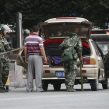
Uyghur Diaspora Faces Government Pressure in Kyrgyzstan
Publication: Eurasia Daily Monitor Volume: 6 Issue: 156
By:

On August 10, Kyrgyz authorities detained Dilmurat Akbarov, the leader of the Ittipak Uyghur society, and his deputy Jamaldin Nasyrov. These leaders had organized demonstrations calling for an independent investigation into last month’s riots in Xinjiang. They featured images and posters accusing Beijing of implementing cruel policies against Uyghurs in Xinjiang. According to the Kyrgyz authorities, approximately 500 people participated in the event in Bishkek (www.akipress.kg, August 10).
The exact reasons for the arrests on August 10 remain unknown, since the government has avoided making any official statements. Many experts in Bishkek believe that these arrests demonstrate the Kyrgyz government’s agreement with Beijing’s policies. The arrested leaders are likely to be released soon, but their future activity based on criticizing the Chinese government will be discouraged.
Over 50,000 ethnic Uyghurs live in Kyrgyzstan, but unofficial records claim that the actual number is much higher. Demonstrations against Beijing’s policy in Xinjiang took place in Almaty and Bishkek in July, but received little attention from the local media.
Ittipak strived to maintain constructive relations with the Kyrgyz regime. The organization is part of the Peoples’ Assembly of Kyrgyzstan, a government body uniting different ethnic minorities. Its former leader Nigmat Bazakov was killed in 2000, allegedly by his enemies who disagreed with his overly-loyal relations with the Kyrgyz regime. At this time China’s influence within Central Asia was becoming more noticeable, according to Rustam Mukhamedov, a New-York based expert. Since then, local reports on Uyghur separatist and terrorist organizations have saturated the local media, while the Shanghai Cooperation Organization (SCO) quickly turned into a regional guarantor of security. China and Russia, both facing separatist movements at home, are the SCO’s leading members.
Bishkek has consistently complied with Beijing’s directives in relation to the Uyghur diaspora. Mukhamedov said that Ittipak is under the close scrutiny of the interior ministry. The August 10 demonstrations were not allowed before the recent presidential election. They were also sanctioned to take place in the outskirts of Bishkek. While only two hours were allocated for the demonstrations, the activists were arrested within the first hour, halting the entire event. Ittipak leaders’ harsh criticism of Beijing’s policies expressed at the August 10 demonstrations came as a surprise to the Kyrgyz authorities. As one Kyrgyz expert told Jamestown, the top ranks of the Peoples’ Assembly of Kyrgyzstan, in which Ittipak is a member, are likely to be sacked soon for allowing these anti-Chinese demonstrations to take place.
As Chinese influence in Kyrgyzstan increased, Ittipak struggled to balance its image between supporting the Uyghur legacy and avoiding being labeled as an extremist organization. This prompted its leaders to publicly express their support for the regime. According to Akbarov, the diaspora supports Kyrgyzstan’s development by organizing charity work, helping veterans and the victims of earthquakes, and promoting the incumbent government (www.ittipak.biz). Most of Ittipak’s initiatives are funded through contributions by local Uyghur businessmen.
Ittipak hopes to celebrate its twentieth anniversary this year. In 2004, the diaspora encountered difficulties in commemorating its fifteenth anniversary. Since then, Ittipak members have avoided mentioning their ideas in the mass media about the unity of the Uyghur peoples across Central Asia and Western China. Due to the August 10 demonstrations, this year’s celebrations are also likely to fail, further complicating the Kyrgyz regime’s relations with the Uyghur diaspora.
Both former president Askar Akayev and the incumbent Kurmanbek Bakiyev have utilized the Peoples’ Assembly to promote support for the government among the country’s ethnic minorities. Local diasporas were allowed some freedom to stage cultural events and preserve their customs and traditions, but were equally expected to support the regime. In this way, Ittipak also supported Bakiyev in the July 23 election, convincing Uyghurs in Kyrgyzstan to vote for him (www.ittipak.biz, June 2). Likewise, the leaders of other ethnic minorities such as the Dungans and Koreans are forced to maintain friendly relations with the regime.
As a member of the SCO, Kyrgyzstan is under strong geopolitical pressure from its larger neighbors. The diaspora was officially warned by the Kyrgyz government to avoid undermining Kyrgyzstan’s relations with China (www.akipress.kg, August 10). Ombudsman Tursunbek Akun promised to investigate the arrest of the Ittipak activists, but he suggested that the movement must terminate its demonstrations.
Last month’s riots in Xinjiang revealed strong sentiments among Central Asian Uyghurs about their shared history and identity. Consequently, family ties were rediscovered between the Uyghurs in Kyrgyzstan and China. "The majority of Uyghurs have relatives back in East Turkistan. Therefore, people are worried about their relatives," Mukhamedov told Jamestown.




